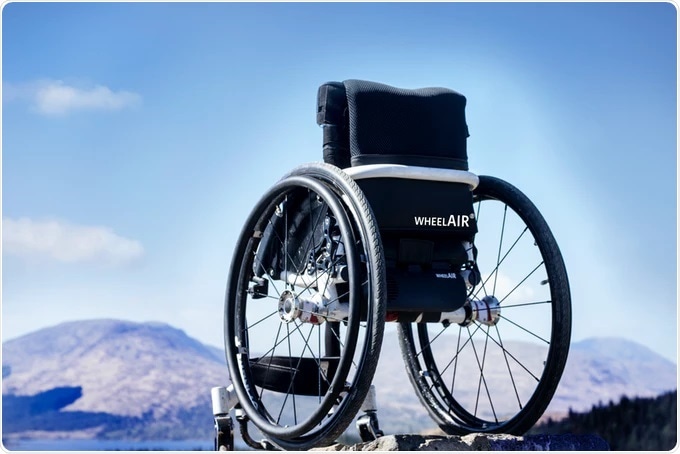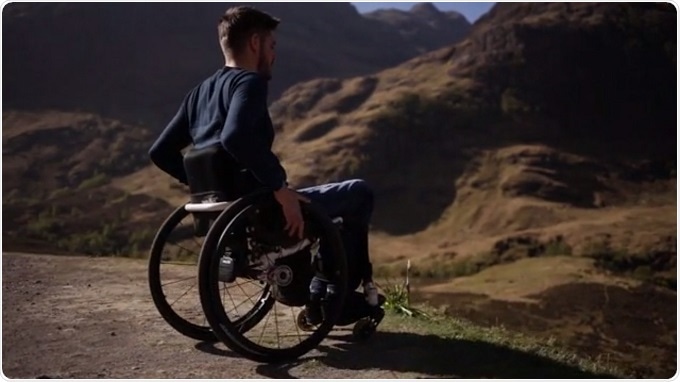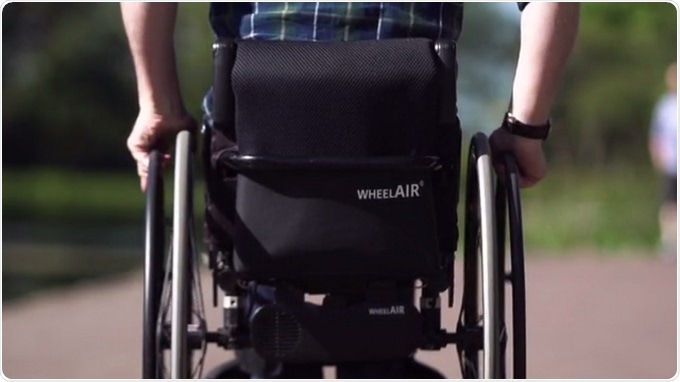People with a Spinal Cord Injury (SCI) are unable to sweat because their body can no longer communicate with their brain. They risk overheating with every revalidation exercise. While this was the main driver for Staels Design, we have since noted that almost every single wheelchair user has issues with heat and moisture.
Some are unable to sweat due to the medication that they are required to take, others with for example Hypermobile Ehlers Danlos Syndrome (hEDS) and Postural Orthostatic Tachycardia Syndrome (PoTS) are unable to regulate their body temperature as a result of a problems with their autonomic system, while those suffering from Multiple Sclerosis (MS) are more prone to overheating because the myelin protective covering around the nerves in the brain is damaged and doesn’t function properly when the body is overheated.
Lastly, everyone who sits in the same position for a long period of time will experience a heat build-up behind their back, able bodied or not. Think of taxi drivers who experience this on a daily basis!
WheelAir® crowdfunding video Staels Design
What is currently done to keep cool on hot days or while exercising?
Preferred methods of cooling vary per person, but the most common ones are using a water spray and portable fan to create artificial sweat, the use of wet towels for the same reason or wear ice vests to cool down quickly.
In extreme situations such as during exercising, athletes are even cooled down with water hoses to prevent cardiovascular damage. If the appropriate cooling does not happen in time, the wheelchair user will experience hyperthermia, nausea or even heart failure.

Please describe the WheelAir®, what it is and how it works?
The WheelAir® is the world’s first cooling wheelchair backrest cushion to bring cooling to all manual wheelchairs. Its ergonomic design provides support, while the unique fan technology blows cool air gently on the wheelchair user’s back, which instantly enhances the user’s comfort and takes away excess heat and moisture.
The cushion works by stripping off your own backrest cushion (which is attached with Velcro), and simply replacing it with ours. Once turned on with the remote, the fan unit sucks in air at the bottom, to then push it upwards and evenly disperse it onto the user’s back.
What are the benefits of using this technology?
WheelAir®’s main benefit is of course the instant cooling feeling created by the airflow. Our user reviews show that not only does the back get cooled, but that this cooling feeling extends through the core and brain.
Another important benefit is the better posture achieved due to the use of higher quality foams and materials, something unseen in the active manual wheelchair industry. Other key benefits are the up to 20 hour battery life, easiness of charging the remote with USB, the adaptability of the cushion to such a huge variety of chairs and the sleek design.
Please describe some of the technical specifications. How cool does the WheelAir® go?
WheelAir® has 4 different cooling intensities which let the user control the speed of the fans. The WheelAir® always uses the ambient temperature to cool down, but even a warmer environment will give an instant feeling of cooling.
The best way to describe it is by comparing it to an office desk fan used in summer: the fan uses the ambient air to cool you down quickly. WheelAir® is also designed to be rain proof and uses a lithium ion battery chargeable through a micro USB.

Are there others on the market, or is the WheelAir® unique? If there are others, how do the products differ?
There is currently one other cooling cushion on the market and it was launched two weeks before we launched ours. The competitive product only fits 1 chair (the brand’s own chair), costs 3 times more than our cushion and only has an 8-hour battery life. WheelAir® is unique because of its adaptability, sleek design and much cheaper price.
Is the WheelAir® environmentally friendly?
Creating a product that is environmentally friendly has always been one of the key focus points from the start. We have made sure to only use fully sustainable materials such as our sustainable fake leather, fully recyclable Polyesters and to only use plastics that are biodegradable. Furthermore, we’ve designed WheelAir® in a modular way so that parts can be replaced and wastage is minimised.
What does the future hold for WheelAir?
Initially, we hope that the WheelAir® will make a real difference to the lives of our users - but we see a very bright future for WheelAir® on other levels too. As Staels Design’s first product, I hope WheelAir® is our stepping stone into providing cooling and heating solutions tailored to the healthcare industry.
We don’t want to stop at manual chairs, but provide solutions to all wheelchairs. Our aim will always be to improve the lives of wheelchair users as much as we can, by providing high quality products that never compromise on style.

Where can readers find more information?
Readers can find more information on our website or on our Kickstarter campaign where everyone can watch our video explaining WheelAir®, its impact and why we do what we do: https://www.kickstarter.com/projects/1858884520/wheelair-the-cushion-that-cools-all-manual-wheelch.
About Corien Staels
 Corien holds an MSc with distinction in International Business and Entrepreneurship from the University of Glasgow and a BA in Textile Technology from the Amsterdam University of Applied Sciences in combination with the Queensland University of Technology, where her work and research focused on sports textiles, product development and business.
Corien holds an MSc with distinction in International Business and Entrepreneurship from the University of Glasgow and a BA in Textile Technology from the Amsterdam University of Applied Sciences in combination with the Queensland University of Technology, where her work and research focused on sports textiles, product development and business.
Corien has industry experience in both strategy consulting and product management with a track record in successfully completing high quality projects.
Throughout her career, she has studied and worked in Belgium, the Netherlands, Norway, Australia and Scotland. Corien is currently an Enterprise Fellow at the Royal Society of Edinburgh while full-time working as the CEO of Staels Design Ltd.